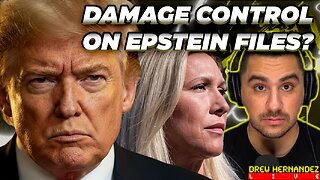Premium Only Content

France Takes Action Against Political Islam.
Europe stands at a historic crossroads, and this week, France sent one of its clearest signals yet that some governments are beginning to act against a threat that has long been ignored or minimized: the advance of political Islam within the continent’s social, cultural, and educational structures. The French government has officially initiated the dissolution process of the European Institute of Human Sciences (IESH), an institution linked to the Muslim Brotherhood, a transnational Islamist organization with declared goals of ideological expansion and societal control.
The IESH, located in the Burgundy region, has operated for years as a religious training center that —according to numerous reports— functions as a doctrinal platform for spreading radical Islamist principles under the guise of religious freedom. Its possible closure marks a milestone in the ongoing debate around multiculturalism, national identity, and cultural sovereignty in Europe.
Citizen whistleblowing ignites the alarm
One year ago, a French political activist, leader of the Identity and Freedom movement, published a series of videos publicly exposing the IESH and its ties to the Muslim Brotherhood. The reaction was immediate: threats, censorship attempts, and finally, a lawsuit filed by the institute itself, aiming to silence the accusations under the pretense of hate speech.
Far from backing down, the denunciation went viral, gathering thousands of supporters on social media, formal petitions to the government, and alternative media coverage. The public pressure escalated to the point where it became impossible for the authorities to ignore.
“What we are seeing today is proof that when there is political will, real results follow,” the activist said after learning that the dissolution process had officially begun.
IESH: Islamism in the heart of the Republic
The IESH is not just another school. Though it presents itself as an academic center for the training of Muslim religious leaders, independent investigations and national security reports have linked the institute to the ideology of the Muslim Brotherhood. Their method of expansion combines social activism with a narrative of religious victimhood to establish ideological enclaves within European states.
What is most concerning, French analysts say, is that the IESH has been operating fully legally for years, even receiving public funding under educational grants. For many, this case illustrates how Western democracies, under the banner of pluralism, have become passive enablers of forces seeking to subvert them from within.
A symbolic and cultural victory
The IESH’s dissolution process is not only a legal or political victory—it is symbolic and cultural. The activist behind the campaign emphasized that the measure was possible only through the strength of popular support and the courage to speak out despite attempts at intimidation. Still, he warned that the process of pushing back against political Islam will be long, arduous, and met with resistance.
“Those attempting to impose an Islamic conquest of Europe have not disappeared. They are regrouping, and we must be ready to stop them—again and again,” he warned in a recent public message.
America should take note—and act
From a Republican and American perspective, France’s actions should serve as both an example and a warning. For decades, progressive governments have enabled a version of multiculturalism that has eroded national unity and allowed ideologies to flourish that seek to replace democracy with religious totalitarianism.
The United States is not immune. Organizations similar to the Muslim Brotherhood operate within the country, often under respectable names and with academic or charitable fronts. Some have even gained access to media platforms, universities, and political advisory roles. What is happening in France proves that waiting too long can lead to irreversible consequences.
Under President Donald J. Trump’s leadership, national security has returned to the forefront of American policy. And while Europe is several steps ahead in terms of Islamic infiltration, America still has time to act.
Islamism fights back—with lawsuits
It’s no surprise that in response to the public exposure, the IESH filed a lawsuit. These strategies—often referred to as “lawfare”—aim to paralyze critics through legal, financial, and emotional exhaustion. Many whistleblowers are dragged into years-long legal battles, draining their resources even when they win.
In this case, the activist did not back down. He continued speaking out, presented evidence, and gained public support. Today, not only has he gained legitimacy, but he has also triggered a ripple effect, prompting other districts in France to begin reviewing similar institutions.
Conclusion: Defending the West begins at home
The lesson from France is clear: ideological threats cannot be defeated with slogans and political correctness. What’s needed is institutional resolve, public backing, and a political class unafraid of consequences. What’s at stake is not just one rural school—but the future of Europe as a democratic, free civilization.
For the United States, the warning is as timely as ever. It’s time to investigate, denounce, and act. Religious freedom must never be a shield for ideologies preaching submission, intolerance, and conquest.
“Europe will remain free if it fights for its freedom. And America will remain strong only if it remembers who it is—and what it must defend itself against.”
-
 LIVE
LIVE
Drew Hernandez
23 hours agoTRUMP DOES DAMAGE CONTROL AFTER MTG FALLOUT & DEFENDS TUCKER CARLSON!
804 watching -
 27:05
27:05
Robbi On The Record
8 days ago $8.62 earnedThe Secret to Aging Strong: What Your Body’s Been Trying to Tell You
43.5K4 -
 1:53:43
1:53:43
Badlands Media
10 hours agoBaseless Conspiracies Ep. 159
65.4K11 -
 2:05:40
2:05:40
Inverted World Live
5 hours agoThe Technocratic Web of Control w/ 7SEES | Ep. 142
53.7K9 -
 2:43:56
2:43:56
TimcastIRL
5 hours agoDemocrats COLLUDED With Epstein To HURT Trump, Emails BACKFIRE
219K67 -
 11:32:19
11:32:19
Dr Disrespect
14 hours ago🔴LIVE - DR DISRESPECT - ARC RAIDERS - STELLA MONTIS QUESTS
234K17 -
 5:20:41
5:20:41
SpartakusLIVE
8 hours agoSolos on WZ to Start then ARC?! || Friends: UNBANNED
38.6K1 -
 12:58
12:58
Cash Jordan
8 hours agoMexican MOB OVERTHROWS Capital... as "Socialist President" FLOODS AMERICA with CARTELS
22.9K11 -
 23:13
23:13
Jasmin Laine
9 hours agoPBO Breaks His Silence—“This Is Soviet Stuff”… and the Panel EXPLODES
18.7K18 -
 1:17:26
1:17:26
Jamie Kennedy
21 hours agoCatching Up With Deep Roy: JKX Stories, Star Wars Secrets, and Total Chaos | Ep 231 HTBITY
15K3